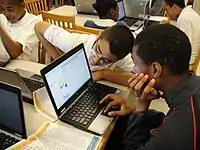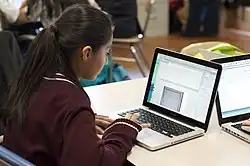| Founded | 2006 |
|---|---|
| Owner | World Wide Workshop |
| Founder(s) | Idit Harel |
| Industry | Education Technology |
| URL | www |
| Users | 17,500 (in 2015) |
Globaloria is an online learning platform oriented to K-12 curricula to teach students to design, prototype, and code educational web/mobile games and simulations with industry-standard technology as a means of learning content and creative innovation skills. Globaloria was developed in 2006 by Idit Harel as a project of the World Wide Workshop Foundation with the stated mission of providing all primary and secondary school students in the U.S. with STEM and computing education opportunities.[1] Globaloria is noteworthy among MOOCs as it is based in constructionist learning theory and Harel's research in the MIT Media Lab.
As of May 2015, Globaloria was being used by over 500 teachers and over 17,000 students in over 50 schools. The product serves participants in 15 states: Alabama, Arizona, California, Florida, Georgia, Illinois, Louisiana, Maryland, New York, Ohio, Oklahoma, Texas, Washington D.C., West Virginia and Wyoming.[2] Globaloria technology and content are designed to cultivate engagement in learning among students on a large scale, and has shown success among schools in rural and urban communities of varied socioeconomic status.[3]
Courses and Services
Globaloria Learning Platform
Globaloria was developed as a response to a perceived lack of computer science and STEM education opportunities in the United States.[4] Following its stated concept goal of a "scalable, digital game-design learning platform, curriculum, and professional development system that is easily integrated into any school,"[5] Globaloria courses each provide a 40- to 100-hour game-design curriculum using industry-standard tools, a customized learning platform with dynamic backend and learning management system, programming and design tutorials, coaching by educators and industry experts, live and digital support systems, and onsite and online educator professional development within a facilitated social community.[6]
Globaloria can be implemented in various formats: as individual courses or a comprehensive cumulative program as part of an existing core curriculum or elective class, or as a stand-alone course activity program such as for after-school programs or camps.[2]
Globey Game Design Competition
Globaloria students participate annually in a game design competitions called the Globeys, implemented as part of the Globaloria curriculum to enhance the rigorous nature of the program.[7] Certificates, prizes and awards are given to the winning teams of each competition in the spring and summer at Globey Award Ceremonies.[8] Student winners are awarded Game Designer Kits, which include a laptop and programming software.[9] Each winning game is published in the Globaloria Game Gallery, where it is viewable and playable by visitors to the site.[10] Each competition has its own deadlines, prizes, ceremonies and expert judges. Past judges have included executives from Adobe, HP, Microsoft, and Google; professional video game producers; education leaders;[8] and government officials including Senator Jay Rockefeller and former West Virginia Governor Bob Wise.[11]

Outcomes

The key outcome of Globaloria courses in any implementation format is that each student successfully learns to take an idea from invention to completion, and to collaborate with peers to design, research, code, program and publish an original educational game. Along the way, students also master global thinking, social media tools such as blogs and wikis, and the skills required to document, chronicle, and co-learn as active members of an online learning community. A profile in Education Week highlighted that Globaloria users develop "the transferable skills of proposal writing, storyboarding, ActionScript software coding, informational blogging, and presentation of progress reports, as students follow a development plan similar to those in the commercial gaming industry through tools available through their account on Globaloria's social learning platform."[12]
Research has shown that Globaloria educates students in technical and computational skills, as well as content knowledge, which results in improved academic performance and increased Constructionist and digital learning abilities, preparing them for college-level studies, digital citizenship, and careers in the global knowledge economy.[13][14] Additionally, Globaloria has been named by the National Center for Women and Information Technology as a "Promising Practice" for engaging girls in computing,[15] as a result of its success shrinking the digital divide faced by girls and minorities.[16]
History
Pilot Platforms

Globaloria was incubated in the World Wide Workshop, beginning in 2006, as a project to combine Harel's research with a blended learning platform for teachers using game design as the core teaching tool.[17] Classes or teams within classes connected to others via an internal social network model. Each community received a wiki-like programmable technology space, used a step-by-step curriculum to learn to design and build a game to be published on the web, and received access to learning content, such as sample games with downloadable codes and custom tutorials. Every participant in the community learned to create a media-rich blog in which to think and reflect regularly on his or her game-making experience and learning process.
Three operational network platforms were tested in the beta version of Globaloria: MyHLife (MyHealthLife), MySLife (MyScienceLife), and MyGLife (My Global Life). Three additional social platforms were developed but not formally launched: MyRLife (MyHumanRightsLife), MyALife (MyArtLife), and MyMLife (MyMathLife).[18]
Globaloria scaled out from the MyGLife platform of World Wide Workshop as an independent enterprise in 2014, its title devised as an amalgamation of "global explorations with media."
Globaloria Programs in U.S. Schools
West Virginia
After several international pilots of Globaloria during 2006-2007,[19] Governor Joe Manchin and the first lady of West Virginia invited Globaloria to launch a pilot program in Marshall Community and Technical College and seven local secondary schools beginning summer 2007. In partnership with the Governor of West Virginia, Benedum Foundation, Center for Professional Development for the State of West Virginia (CPD), Knight Foundation, and other supporting organizations, the World Wide Workshop implemented a statewide pilot program that brought the Globaloria program into classrooms throughout West Virginia. With a customized curriculum, training, and support programs developed by the World Wide Workshop, Globaloria game and simulation production classes were introduced to seven groups, representing middle schools, high schools, vocational schools and community colleges for grade and credit in June 2007. In its first pilot year, 89 students and 18 educators used the Globaloria-WV program's MyGLife network to design educational web-games.[20] This expanded to 40 secondary schools across West Virginia by 2011, aided by grants from a variety of industry and education sources.[21][22] The efficacy of the West Virginia program was the subject of longitudinal and case studies by research partners and independent study, which suggest that use of the Globaloria program in schools increases students' knowledge and use of technology, particularly among girls and underserved populations,[15][16] is linked to gains on standardized tests,[23][24][25] and advances both self-directed and collaborative learning in the classroom.[26][27]
Texas
Since 2009, with funding from the AMD Foundation, Globaloria has been deployed at East Austin College Prep, where every student participates in a daily 60- to 75-minute Globaloria class to develop educational and social-issue games or simulations focusing on original educational and social issue topics.[28] In 2012, Globaloria expanded to neighboring Manor Independent School District, and was also offered as a summer camp in collaboration with Skillpoint Alliance.[29]
California
In 2011, Globaloria launched in Silicon Valley with about 180 youth.[30] The program has grown steadily, reaching 1,500 youth in 2013 with a 100% retention rate among sites.[31]
Florida
In 2011, Globaloria was implemented throughout middle and high schools in the Hillsborough County Public Schools district to enrich the district's formal STEM curriculum.[32]
New York
Globaloria has been active across New York City schools since January 2011, when it partnered with IS 364 Gateway Intermediate School in Brooklyn. This pilot then inspired the program's expansion among The Young Women's Leadership Schools, as well as to a number of the city's iZone schools, including the Bronx Writing Academy, where Globaloria is offered to all 7th grade students.[33] Globaloria workshops were offered at the National Jazz Museum in Harlem in 2011, to teach jazz history and digital literacy to youth through game design. The workshops were a collaboration with jazz artists Jonathan Batiste and his band Stay Human.[34]
Wyoming
Launched in 2013, Globaloria expanded to Wyoming's Sheridan County School District Number 1, where all middle schools offer Globaloria to their 6th and 7th grade students, and the program is being expanded to the high school.[35]
Awards
- The Tech Museum: Tech Awards Microsoft Education Award Laureate (2013)[36]
- Silicon Valley Education Foundation: STEM Innovation Award in Science (2013)[37]
- Software and Information Industry Association: Innovation Incubator Honoree (2013)[38]
- National School Boards Association: Technology Innovation Showcase Honoree (2013)[39]
- Lights. Camera. Help.: Film Festival Finalist (2010) - World Wide Workshop documentary series "Voices from the Field" was selected as finalist in this Austin-based film festival for nonprofit and cause-driven films. "Voices" consisted of 32 video vignettes exploring the learning stories and reflections of young students and their educators who learn and teach with Globaloria.[40]
External links
- Globaloria company home page
- World Wide Workshop impact reports on Globaloria project efficacy, including links to independent research
References
- ↑ Cameron Wilson; Leigh Ann Sudol; Chris Stephenson; Mark Stehlik (2010). Running on Empty: The Failure to Teach K-12 Computer Science in the Digital Age (PDF) (Report). Association for Computing Machinery.
- 1 2 "Products on EdSurge - Globaloria". EdSurge. Retrieved 5 Aug 2015.
- ↑ O'Hanlon, Charlene. "Don't Play It, Make It!". The Journal. 1105 Media Inc. Retrieved 22 October 2013.
- ↑ "Facts and Resources". Computing in the Core. Computing in the Core. Archived from the original on 1 November 2013. Retrieved 30 October 2013.
- ↑ "Globaloria: Invent. Build. Share". The Tech Awards. The Tech Museum of Innovation. Archived from the original on 23 October 2013. Retrieved 22 October 2013.
- ↑ "How to Participate". Globaloria. World Wide Workshop. Retrieved 17 October 2013.
- ↑ Matas, Alison (August 8, 2012). "Students' anti-bullying video game finalist for award". The Charleston Gazette. Retrieved 28 October 2013.
- 1 2 "Game Design Awards". World Wide Workshop. World Wide Workshop. Retrieved 28 October 2013.
- ↑ "W.Va. Students Win 2nd Annual Globaloria Civics and STEM Games Competitions". WVDE News. West Virginia Department of Education. Retrieved 1 October 2011.
- ↑ "Motivating Deeper Student Learning: The Globeys Design Awards" (PDF). The Journal of Media Literacy. 59 (1): 43. December 2012.
- ↑ "Winning teams, awards announced in Charleston". The Inter-Mountain. August 15, 2012. Archived from the original on 23 October 2013. Retrieved 28 October 2013.
- ↑ Quillen, Ian (13 June 2012). "Students Tackle Video Game Design". Education Week. Retrieved 10 May 2013.
- ↑ Rockman; Borland, J.; et al. (September 2013). Globaloria: Second Year Implementation & Outcome Report for Silicon Valley (PDF) (Report). World Wide Workshop. Retrieved October 24, 2013.
- ↑ Edvantia Inc; Chadwick, K.; Gore, J.; Hsiang-Yeh, H. (February 2013). Globaloria Replication Study: An Examination of the Relationships between Globaloria Participation and Student Achievement in Year 5 of the West Virginia Pilot Implementation (Report). World Wide Workshop.
- 1 2 Ashcraft, Catherine; Wu, Zhen; DuBow, Wendy; Reynolds, Rebecca (August 2012). "Assessing Girls' Interest, Confidence, and Participation in Computing Activities: Results for Globaloria West Virginia". National Center for Women & Information Technology. National Center for Women & Information Technology. Retrieved 28 October 2013.
- 1 2 Reynolds, Rebecca (April 2011). Possible Contributors to Evaluated Student Outcomes in a Discovery-Based Program of Game Design Learning (PDF). American Education Research Association annual conference. New Orleans, LA.
- ↑ "Driving Innovation in the World of Education: Globaloria". The Silicon Review. Retrieved 8 August 2015.
- ↑ "Past Programs". World Wide Workshop. World Wide Workshop. Retrieved 28 October 2013.
- ↑ "Teach-yourself game design site". BBC News. January 15, 2008.
- ↑ "West Virginia Center for Professional Development Partners with World Wide Workshop to Help Educators and Students Gain 21st Century Learning, Life and Technology Skills" (PDF) (Press release). West Virginia Center for Professional Development. Archived from the original (PDF) on 7 January 2009. Retrieved 2 October 2008.
- ↑ "Globaloria: World Wide Workshop for Children's Media Technology & Learning". What We Fund. Knight Foundation. Retrieved 30 October 2013.
- ↑ "ESA Foundation Awards Grants to Nine Organizations for 2011" (Press release). The ESA. October 7, 2010. Retrieved 5 August 2015.
- ↑ Chadwick, Kristine; Gore, Jessica; Hsiang-Yeh, Ho (February 2013). "Globaloria Replication Study: An Examination of the Relationships between Globaloria Participation and Student Achievement in Year 5 of the West Virginia Pilot Implementation" (PDF). World Wide Workshop Reports. Edvantia, Inc., WV. Retrieved 28 October 2013.
- ↑ Chadwick, Kristine; Gore, Jessica (January 2011). "Globaloria Replication Study: Examining the Robustness of Relationships between Globaloria Participation and Student Achievement" (PDF). World Wide Workshop Reports. Edvantia, Inc., WV. Retrieved 28 October 2013.
- ↑ Chadwick, Kristine; Gore, Jessica (February 2010). "The Relationship of Globaloria Participation and Student Achievement" (PDF). World Wide Workshop Reports. Edvantia, Inc., WV. Retrieved 28 October 2013.
- ↑ Borland, Jennifer (July 2012). "An Evaluation Report on Two School-Based Implementations in Silicon Valley" (PDF). Reports. Rockman et al. Retrieved 21 October 2013.
- ↑ Whitehouse, Pamela (2011). "Networked Teacher Professional Development: The Case of Globaloria". Journal of Interactive Learning Research. 22 (1): 139–165.
- ↑ Aronowitz, Scott. "'Changing the Game' Grants To Help Grow Nascent Texas Middle School". The Journal. 1105 Media, Inc. Retrieved 17 October 2013.
- ↑ "Globaloria in Action". World Wide Workshop. World Wide Workshop. Retrieved 17 October 2013.
- ↑ Cassidy, Mike (July 23, 2011). "Cassidy: Globaloria brings new way to learn to Silicon Valley". San Jose Mercury News. Retrieved 17 October 2013.
- ↑ Burritt, Kara. "Silicon Valley kids use tech to create and learn". Knight Blog. John S. & James L. Knight Foundation. Retrieved 17 October 2013.
- ↑ "Globaloria in Action". World Wide Workshop. World Wide Workshop. Retrieved 15 May 2013.
- ↑ "Globaloria in Action". World Wide Workshop. World Wide Workshop. Retrieved 25 October 2013.
- ↑ Callum, Paige (December 2012). "What Is Globaloria?" (PDF). The Journal of Media Literacy. 59 (1): 13.
- ↑ "Globaloria in Action". World Wide Workshop. World Wide Workshop. Retrieved 26 October 2013.
- ↑ "The Tech Awards Laureates 2013". The Tech Awards. The Tech Museum of Innovation 2013. Retrieved 6 August 2015.
- ↑ Steuer, Meredith. "Silicon Valley Education Foundation Names Award Winners for STEM Innovation". STEMblog. STEMconnector. Archived from the original on 23 October 2013. Retrieved 22 October 2013.
- ↑ "Education Technology Pioneers Announced as Participants for SIIA Innovation Incubator Program". Archived from the original on 4 March 2016. Retrieved 6 August 2015.
- ↑ "NSBA 2014 Annual Conference & Exposition - Globaloria". Archived from the original on 5 March 2016. Retrieved 8 August 2015.
- ↑ "The World Wide Workshop's Documentary Series "Voices from the Field" Named Finalist in This Year's Light. Camera. Help. Film Festival in Austin, Texas" (PDF) (Press release). New York, NY: World Wide Workshop. July 15, 2010. Retrieved 2013-10-28.